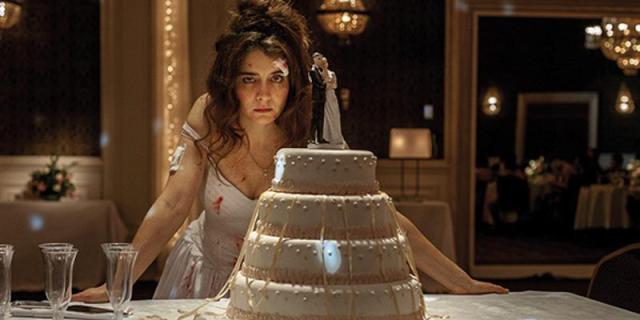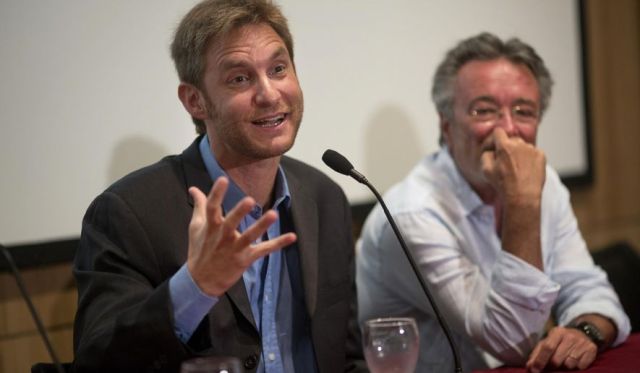
Like funerals, wedding can bring out the worst in us
Wild Tales (Relatos Salvajes) is the perfect film for those with a short attention span.
It’s my kind of film, subversive, satirical, carrying a punch in the social plexus. There’s heat, ill-temper, anger, fury, and revenge killing. Great! I am up for that. In common parlance, each character is seriously pissed off and out for blood. What a delight we derive from watching others on the path of vengeance by criminal means.
At a time when cinemas grab you by the wallet and say “Cough!” it’s gratifying to find a movie that does not leave you bitter about wasting a small fortune for two hours crap entertainment – £9 to £15 each ticket, junk food, a million carbs ice-cream, and travel costs. In this instance the hype on Wild Tales won’t make you feel you’ve been duped.
A portmanteau film where each story is as good as the last, I can’t remember another like it in the last ten years. Speilberg’s The Twilight Zone had a different director for each segment. After that was Tarantino’s over-long, over-indulgent Pulp Fiction, and Monty Python’s The Meaning of Life lost momentum as it progressed.
Robert Altman’s attempt at portmanteaux was Short Cuts, but I can only remember the scene where all the characters are united by a Californian earthquake. I enjoyed Paul Haggis’s Crash though some of the characters are horribly over-the-top over-wrought in the fashion of a lot of Hollywood film and television melodrama. Crash was a curates egg of a movie. Wild Tales is enthralling start to finish.
The film has three obvious weaknesses – clever, inspired, and spoken in Spanish, three attributes certain to shove it into your local art house cinema out of sight and on a screen no bigger than your flat screen television. That’s where the industry parks the good stuff.
Consisting of six different stories, each with a beginning middle and an end related to the same theme – the cruelties we inflict upon each other that cause us to seek revenge – yet, because of the way content is handled somehow they coalesce into a satisfying cohesive whole. It is wonderfully well acted by all the cast, fantastically well filmed, and memorable.

Writer- director Damian Szifron
It won Best Foreign Film at the Oscars so no one should worry about taking a chance on a film with subtitles. My wife is the best test of a good film. She loved Wild Tales, more interesting than any film she had seen for a long year. She’s a tough cookie to impress. At the premier of Unforgiven, twenty minutes into Clint Eastwood’s best since The Outlaw Josie Wales, she stood up and said, “This is a load of macho rubbish!” (gulp!) and off she strode to the bar. The problem was, Eastwood was sitting in the front row. It takes a minor masterpiece and better to sway her. I digress.
With Hollywood’s domination of cinemas worldwide achieved by old-fashioned blackmail, you take a studio’s group of films or you do not get the profit-raking blockbuster, Tinsel Town has fallen into a predicable annual conveyor belt to rid itself of turkeys.
From January to April studios release their worst films, and a few that they have no idea how to market. From May to August we get the blockbusters, nowadays relying too heavily on Marvel comic super-hero garbage, and from September to the end of December they release their best work in preparation for Oscar contention. Smart filmgoers seek out foreign films until spring is over knowing the worst will be superior to Hollywood’s dross. Wild Tales is a film you could see at any time in the year but good to discover it now. It is released by Sony’s ‘independent’ wing, Sony Pictures Classic.
The six stories are: Pasternak: a beautiful woman takes a flight only to discover the man sitting nearby is the music critic who destroyed her former boyfriend’s career; The Strongest: a Barbarian of a truck driver and a short-tempered car driver spar it out on a lonely mountain road; The Rats: when he dines at her café a gangster is recognised by the waitress whose family were ruined by him; The Proposal: a young driver kills a pedestrian in a hit-and-run but his status-protective wealthy father is unwilling to call the police; Little Bomb: a demolition expert turns homicidal when his car is impounded not once but twice; and Until Death Do Us Part: in a whirlwind of a huge Bacchanalian wedding ceremony the bride discovers her new husband was unfaithful the night before and the damned woman is at the wedding. There is no link between each segment, one ends, the screen goes to black, a new story begins.
Each happenstance is a recipe for tragedy and disaster. Like a locomotive and carriages steaming full power to the river’s broken bridge ready to collapse that’s exactly where each story goes with unerring, dreaded, horrific inevitability.
We can recognise the situations each character finds themselves, familiar because we have experienced similar to some degree, the sort that get the hackles bristling on the back of your neck. For us there is a line we won’t cross, we hold tight to our humanity but for the characters there is no line. They go the whole hog displaying the worst of human nature.

The briefest of incidents can escalate into a tragedy
Despite the violence I found my self chuckling at the antics on screen and often laughing, pleased to discover afterwards that a great deal of the stories are meant to be high comedy. The Jewish wedding story is blissfully hilarious. For example, when a particularly unsympathetic character is swung through a large mirror on the dance floor any resistance is useless, biting your lip, sticking a finger nail into your palm, stuffing your mouth with those cheap rubbery sweets made of boiled horses hooves, a guffaw let loose will burst into a bottom-of-the lungs roar of laughter! The tension each story brings wants for release.
The Argentine writer-director Damián Szifrón’s guides the dramas to their cataclysmic fate, but one of the executive producers behind Wild Tales is none other than Spain’s Pedro Almodóvar which probably explains all the excellent roles for women we see.
This movie could have been written and filmed in Scotland had we a film industry of any real kind. Assuming we had, and still had to tramp to London for investment, I can hear the commissioning producer in charge of the fund throwing the script down on his desk saying, “Give me a break! There’s not a single sympathetic character in the entire thing! “
One word of warning, the first story was filmed before life imitated art. No point in spoiling things here, but any nervous laughter you have is wiped away in an instant when you put two-and-two together and understand the chilling situation.
- Star rating: four stars
- Cast: Darío Grandinetti, María Marull, Mónica Villa
- Writer-director: Damián Szifron
- Cinematographer: Javier Julia
- Composer: Gustavo Santaolla
- Duration: 2 hours 2 minutes
- RATING CRITERIA
- 5 plus: potential classic, innovative. 5: outstanding. 4: excellent. 3.5: excellent but flawed. 3: very good if formulaic. 2: straight to DVD. 1: crap; why did they bother?

You must be logged in to post a comment.